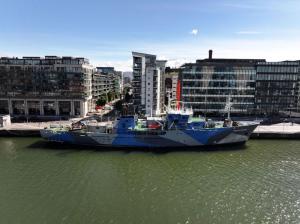
CAPTAIN PAUL WATSON FOUNDATION TO INTERCEPT JAPANESE FACTORY WHALING SHIP VIA NORTHWEST PASSAGE
Seldom used passage to be transited during summer melt to reach Japan’s renewed whale hunting in the North Atlantic
“The plan is to go after the world's largest and most dangerous whaling ship, the Kangei Maru, and lock its operations…we have to get to the Pacific and the shortest route to the North Pacific is through the Northwest Passage.” stated Watson from the wheelhouse of CPWF’s vessel in the Liffey River, Dublin.
The mission, termed Operation Kangei Maru, marks 50 years of Paul Watson's anti-whaling marine activism, “this is the most high stakes mission in all my years of opposing whaling in the World’s oceans” stated Watson. CPWF or Neptune’s Navy, as its marine operations arm is known, is set to be the first anti-whaling ship to ever attempt the notoriously difficult passage, which stretches from Baffin Bay, west of Greenland, to the Beaufort Sea north of Alaska. The passage has only been completed in its entirety by 262 vessels in history.
The M/Y John Paul DeJoria, with a complement of 26 mainly volunteer crew from 13 countries, will head north through the Irish sea, across the Atlantic and up the west coast of Greenland. With the summer melt beginning, the vessel will have approximately six weeks to transit the passage and reach the Bering Strait before September begins. The full passage from Dublin to Dutch Harbor will stretch approximately 5,500 nautical miles (about 10,000 kilometers) and could take up to 40 days to complete.
While CPWF had been poised to confront Icelandic whaling this summer, a last minute pause by Iceland’s last whaling company, Hvalur HF, has allowed the group to refocus its assets on a renewed threat; Japan’s emboldened whaling industry.
“With a brand-new 50 million dollar long range factory ship, Japan will not likely need to import whale meat from Iceland in the future. Japan’s new factory ship, the Kangei Maru, cannot be allowed to return to high seas whaling,” says Locky MacLean, Ship Operations Director at CPWF.
Japan, whose Antarctic research whaling program JARPA was deemed illegal by the International Court of Justice in 2014, makes no qualms about its intentions to resume commercial whaling. They are presently testing the new factory vessel, engaging in whaling operations off the east coast of Sapporo, Japan’s northernmost island. At the time of writing, the M/Y John Paul DeJoria is taking on final provisions in Dublin as the crew prepares to set sail.
###
ABOUT CAPTAIN PAUL WATSON FOUNDATION: The Captain Paul Foundation, founded in 2022 by esteemed environmental and conservation activist Paul Watson, co-founder of Greenpeace and founder of Sea Shepherd, alongside tech entrepreneur Omar Todd, is a US-based non-profit dedicated to marine conservation. Committed to halting habitat destruction and wildlife slaughter in the world’s oceans, the foundation aims to safeguard marine ecosystems and species. It uses innovative direct-action tactics to expose and confront illegal activities at sea. Visit www.paulwatsonfoundation.org for more information.
###
ADDITIONAL INFORMATION
HIGH SEAS WHALING BACKGROUND:
On 31 March 2014, the International Court of Justice (ICJ) ruled that Japan’s whaling activities in Antarctica did not comply with Article VIII of the International Convention for the Regulation of Whaling (ICRW), which permits whaling for scientific purposes. Despite this, Japan continued its operations, in breach of the ruling for two additional seasons before ceasing its whaling operations in the Antarctic. Since this time, despite assurances in regards to its intentions to restart high seas whaling, Japan has maintained it will only allow for coastal whaling in the future. Despite this a purpose-built Japan continued its operations, in breach of the ruling for two additional seasons before ceasing its whaling operations in the Antarctic.
Captain Paul Watson
The Captain Paul Watson Foundation
email us here
Visit us on social media:
Facebook
X
LinkedIn
Instagram
YouTube
EIN Presswire does not exercise editorial control over third-party content provided, uploaded, published, or distributed by users of EIN Presswire. We are a distributor, not a publisher, of 3rd party content. Such content may contain the views, opinions, statements, offers, and other material of the respective users, suppliers, participants, or authors.


